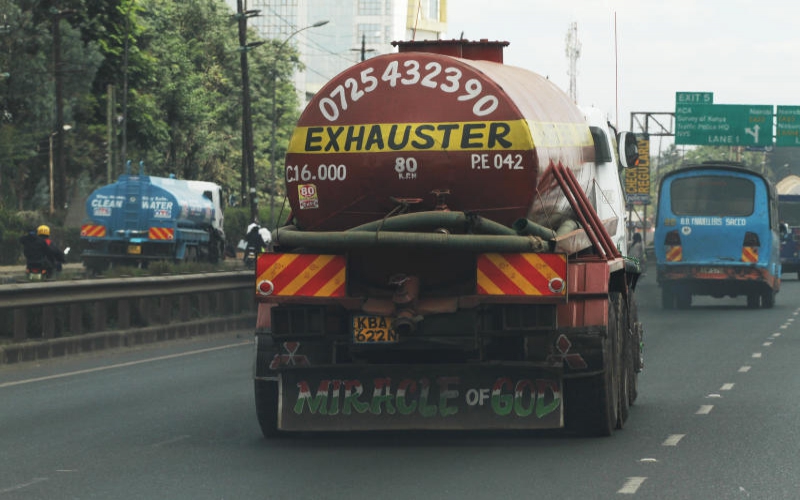
A war over where over two million litres of domestic waste generated daily by Nairobi residents should be dumped is shaping up.
At the heart of the unfolding disagreement is control of the lucrative multi-million sewerage sector, triggered by the closure of a public discharge point at Kariobangi.
And the million-shilling question is: where is the sewage from the affluent Karen, Muthaiga, Lavington and informal settlements in Kibera and Korogocho supposed to be dumped? These residential areas are not served by Nairobi Water and Sewerage Company sewer system and rely on “honey suckers’ also known as ‘exhausters’ to empty their septic tanks.
According to a notice issued last Wednesday by the Nairobi Water and Sewerage Company, all private exhausters are not allowed to discharge their waste in Kariobangi, a ban that took effect yesterday.
Discharge points
This means that an estimated 200 trucks that carry raw sewage from Nairobi and the larger metropolis to Kariobangi will now have to detour to either Ruai or Mwiki.
And they are unhappy because after paying an annual fee of Sh60,000 to Nairobi City Water and Sh3250,000 to county governments to be allowed to operate, they are being herded to a privately owned discharge point where they are expected to pay Sh500 per truck.
Currently, there are only two public disgorge points which exhauster owners complain are far away and will lead to additional costs.
They complained that the closure of the public dump site coincided with the opening of a private discharge point in Njiru, where they are charged between Sh300 and Sh500 per truck depending on the capacity.
Complaint letter
“The private discharge point was built by people known to Nairobi Water Company officials. For over 10 years, the area has been served by one point while sewer coverage is work in progress till today,” said Paul Mwaniki, the chair of Private Exhausters Service Providers Sacco (Pesp Sacco), in a letter dated October 20 addressed to the Director-General of Nairobi Metropolis Service.
According to the private exhausters, initially, there were eight points that were reduced to one point for the Nairobi Metropolitan Area.
Mwaniki further claimed Nairobi Water had carried out an Environmental Impact Assessment and obtained a certificate on February 9, 2016, but handed it over to a self-help group for residents Njiru and who now control the discharge point.
However, Nairobi Water Managing Director Nahashon Muguna denied there were any interests between his company and the community-based organisation.
“It is true we carried out the environmental impact assessment for Smart Methods. It is our duty to assist anybody who wants to establish a discharge point. If private exhausters are interested, we can assist them too. In fact we have funds to assist such groups to establish more discharge points,” he said.
According to Muguna, there was no ill motive in closing down the Njiru and Kariobangi discharge points. “The discharge point at Njiru was established on land belonging to a secondary school. When the school was constructed, the discharge point was destroyed and the place fenced off.”
He further explained that Kariobangi discharge point has been closed because it was not ideal for the many trucks which were discharging waste there. The road to the discharge point was narrow, leading to accidents.
Owing to scarcity of land in the neighbouring counties of Kiambu, Kajiado and Machakos, most of the human waste generated in Limuru, Ruiru, Mlolongo, Kitengela, Ngong and Rongai is carted to Dandora Sewerage Treatment plant.
The exhauster owners charge between Sh8,000 and Sh10,000 per truck depending on the capacity and distance. Ordinarily, they are not supposed to pay when discharging their load at public dump sites since the waste is later carried by the Nairobi Water sewer trunk.
However, exhauster owners do not want to contend with the long journey to the Dandora because of the distance. Now, they have to part with between Sh300 and 500 to discharge waste of a single truck in the private discharge point at Njiru
But as Nairobi Water waits for the expansion of the sewer line, the 200-odd licensed privately owned exhausters will continue sucking and ferrying the waste from Karen, Muthaiga, Kibera, Rongai, Kitengela and Mlolongo.

